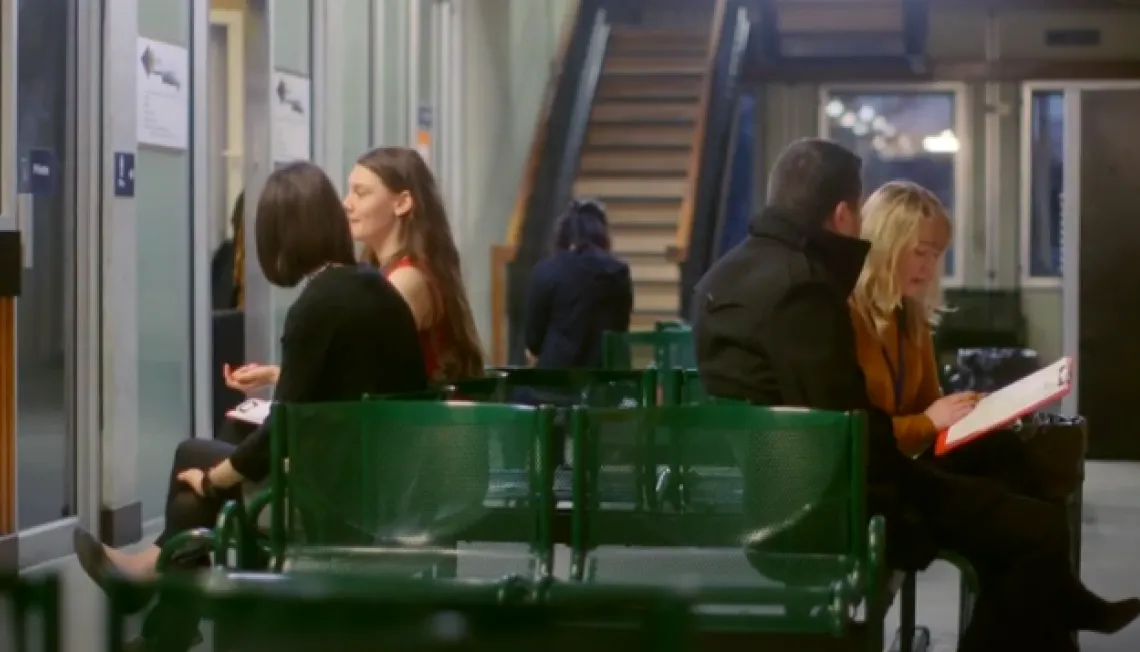Community Advice is overseen and run by Michelle McGuire, with the help of volunteers. Since its inception in 2014 the service has supported over 2500 people. It is independent of the court and any criminal justice proceedings. The aim of the programme is “to stop reoffending, and to connect people to their local community and the support that they need.”
Routes to support
Michelle states that she and her volunteers aim to be “a friendly face at court”. They begin the day by walking around the court building greeting those appearing in court and their families, offering directions and explaining court processes. They hand out leaflets explaining what the service offers and encourage people to come by the office after their court appearance if they need advice or would like to talk. Michelle states that those who may be too stressed or agitated to seek support on the day of their court appearance often contact the service in the weeks that follow. The team also visit the cells at court to see if anyone on remand would like some support. Depending on the client’s needs, the team may be able to provide support on the spot or signpost the individual to an appropriate service within the local community.
Assessment and tailored support
Anyone who approaches Community Advice for support is first offered a detailed assessment where they can talk freely about their support needs. The assessment form details the issues with which the service can offer support, and individuals can request support with as many issues as they like including: debt, benefits, housing, employment, education and training, domestic abuse, drugs and alcohol and health. The most common need that people present with is housing, followed next by benefits needs or debt repayment consolidation. Michelle aims to be flexible in meeting the needs of individuals, and has also helped clients to obtain birth certificates, bank accounts or passports.
Community Advice is not a casework service. If someone comes to the service in need of emotional support or advice about benefits, the team can help clients to complete the relevant application forms and access the support they need. Community Advice refers clients to over 30 local support organisations. The team have an excellent knowledge of local support services in general, and have built relationships all over London with other service providers. Michelle emphasises how invaluable this is – where an individual is nervous and reluctant to present at a support service, where possible she will phone ahead to let the service know to expect them. This gives them more confidence to approach services.
Follow up
Whilst Community Advice does not provide casework as such, it does conduct follow up calls to everyone who has been assessed. These calls are made two weeks, two months and then six months after a person first accessed the service. The purpose of these calls is to support individuals, and encourage them to approach services if they have not yet done so. If the individual has sought support from the agencies to whom they were signposted, the follow up call seeks to ascertain whether these referrals were helpful, and provides an opportunity to discuss any new support needs that may have arisen.
Case studies
Susan* received support from Michelle after she was sent a large electricity bill, despite always having paid her bills on time. Susan worked fulltime and lived in a one-bedroom apartment. Her electricity company, EDF, sent her a £1700 bill for the period May 2013 – June 2019. Susan was distressed and at a loss as to why she had received such a large bill. Michelle contacted EDF on behalf of Susan to arrange for Susan to repay the £1700 by way of a payment plan. EDF informed Michelle that Susan had been sent a “catch-up” bill because they had undercharged her during that period because she had not provided the metre reading. Through discussions with EDF a consumption check was also arranged at Susan’s property, which came back regular. EDF advised Michelle that they wanted Susan to pay £76 back per month, in addition to her usual bills. However, through some research that Michelle conducted in relation to national debt collection laws, Michelle brought it to EDF’s attention that electricity companies are not permitted to pursue domestic debts over 12 months old. It was subsequently agreed that £1400 of the bill would be written off. This brought much relief to the Susan, who has continued to pay her bills on time.
Michelle also recalls providing emotional and practical support to Lisa*, whose son received a six-month custodial sentence in court. Lisa approached the service in a distressed state and crying hysterically after her son received his sentence. Michelle brought Lisa to a private room, gave her a tissue, and allowed her some time to cry. When Lisa calmed down, she explained that she suffers from arthritis and mobility problems, and sometimes gets stuck in a seated position and cannot get up. Her son was living with her and acted as her carer, so when he received a custodial sentence, Lisa was worried about getting stuck at home with no one to come to her aid. Michelle supported Lisa to complete an application for PIP benefit, and to explore who in her family could act as her carer in her son’s absence. Lisa identified her niece, and Michelle telephoned Lisa’s niece on her behalf, who agreed to act as Lisa’s carer. Lisa appreciated the follow up calls from the service and reported that she was coping well in her son’s absence.
*Not their real names.
Contact
Community Advice is located at:
Highbury Corner Magistrates Court, 51 Holloway Road, London, N7 8JA.
Tel: 07941510242
This case-study was compiled in 2020
